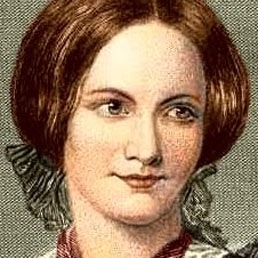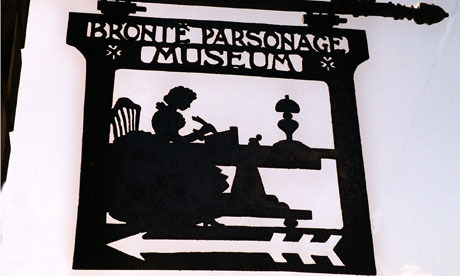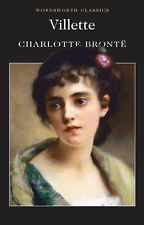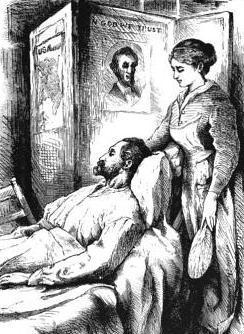19th Century Epic Romances discussion
Nominations
>
Nominating Books
date newest »
newest »
 newest »
newest »

 Villette by Charlotte Brontë
Villette by Charlotte Brontë Summary --
With her final novel, Villette , Charlotte Bronte reached the height of her artistic power. First published in 1853, Villette is Bronte's most accomplished and deeply felt work, eclipsing even Jane Eyre in critical acclaim.
Bronte's narrator, the autobiographical Lucy Snowe, flees England and a tragic past to become an instructor in a French boarding school in the town of Villette. There, she unexpectedly confronts her feelings of love and longing as she witnesses the fitful romance between Dr. John, a handsome young Englishman, and Ginerva Fanshawe, a beautiful coquetter.
This first pain brings others, and with them comes the heartache Lucy has tried so long to escape. Yet in spite of adversity and disappointment, Lucy Snowe survives to recount the unstinting vision of a turbulent life's journey—a journey that is one of the most insightful fictional studies of a woman's consciousness in English literature.

Author Biography
• Birth—April 21, 1816
• Where—Thornton, Yorkshire, England
• Death—March 31, 1855
• Where—Haworth, West Yorkshire, England
• Education—Clergy Daughters' School at Cowan Bridge in Lancashire; Miss Wooler's School at Roe Head; Pensionnat Heger (Belgium, to study French and German)

Bronte was born on April 21, 1816, in Thornton, Yorkshire, in the north of England, the third child of the Reverend Patrick Bronte and Maria Branwell Bronte. In 1820 the family moved to neighboring Haworth, where Reverend Brontë was offered a lifetime curacy. The following year Mrs. Brontë died of cancer, and her sister, Elizabeth Branwell, moved in to help raise the six children.

Haworth parsonage, the Brontës' home in Yorkshire, England
The four eldest sisters—Charlotte, Emily, Maria, and Elizabeth—attended Cowan Bridge School, until Maria and Elizabeth contracted what was probably tuberculosis and died within months of each other, at which point Charlotte and Emily returned home. The four remaining siblings—Charlotte, Branwell, Emily, and Anne—played on the Yorkshire moors and dreamed up fanciful, fabled worlds, creating a constant stream of tales, such as the Young Men plays (1826) and Our Fellows (1827).
Reverend Bronte kept his children abreast of current events; among these were the 1829 parliamentary debates centering on the Catholic Question, in which the Duke of Wellington was a leading voice. Charlotte's awareness of politics filtered into her fictional creations, as in the siblings' saga The Islanders (1827), about an imaginary world peopled with the Brontë children's real-life heroes, in which Wellington plays a central role as Charlotte's chosen character.
Throughout her childhood, Charlotte had access to the circulating library at the nearby town of Keighley. She knew the Bible and read the works of Shakespeare, George Gordon, Lord Byron, and Sir Walter Scott, and she particularly admired William Wordsworth and Robert Southey. In 1831 and 1832, Charlotte attended Miss Wooler's school at Roe Head, and she returned there as a teacher from 1835 to 1838. After working for a couple of years as a governess, Charlotte, with her sister Emily, traveled to Brussels to study, with the goal of opening their own school, but this dream did not materialize once she returned to Haworth in 1844.
Midlife

In 1846 the sisters published their collected poems under the pen names Currer (Charlotte), Ellis (Emily), and Acton (Anne) Bell. That same year Charlotte finished her first novel, The Professor, but it was not accepted for publication.
However, she began work on Jane Eyre, which was published in 1847 and met with instant success. Though some critics saw impropriety in the core of the story—the relationship between a middle-aged man and the young, naive governess who works for him—most reviewers praised the novel, helping to ensure its popularity. One of Charlotte's literary heroes, William Makepeace Thackeray, wrote her a letter to express his enjoyment of the novel and to praise her writing style, as did the influential literary critic G. H. Lewes.
Following the deaths of Branwell and Emily Bronte in 1848 and Anne in 1849, Charlotte made trips to London, where she began to move in literary circles that included such luminaries as Thackeray, whom she met for the first time in 1849; his daughter described Bronte as "a tiny, delicate, serious, little lady." In 1850 she met the noted British writer Elizabeth Gaskell, with whom she formed a lasting friendship and who, at the request of Reverend Bronte, later became her biographer. Charlotte's novel Villette was published in 1853.
In 1854 Charlotte married Arthur Bell Nicholls, a curate at Haworth who worked with her father. Sadly, less than a year later, Bronte died during her first pregnancy. While her death certificate lists the cause of death as "phthisis" (tuberculosis), there is a school of thought that believes she may have died from excessive vomiting caused by morning sickness. At the time of her death, Charlotte Brontë was a celebrated author. The 1857 publication of her first novel, The Professor, and of Gaskell's biography of her life only heightened her renown. (Bio from Barnes and Noble Classic Edition.)

If you don't have the book, go here for an online copy of Villette.
There are 42 chapters, click on the chapter on the left side of the page.

http://www.bronte.netfury.co.uk/ville...
 Terry wrote: "Thanks for posting, Carol! That was interesting to find out that Elizabeth Gaskell was friends with Charlotte Bronte and wrote her biography. However, I am going to pass on this month's group read..."
Terry wrote: "Thanks for posting, Carol! That was interesting to find out that Elizabeth Gaskell was friends with Charlotte Bronte and wrote her biography. However, I am going to pass on this month's group read..."Sorry you won't be here for this month. November and December are busy months.
I own a copy of her biography
 The Life of Charlotte Brontë by Elizabeth Gaskell but I have not read it because the type is TINY! (like 8 point.) I would advice not to get this edition.
The Life of Charlotte Brontë by Elizabeth Gaskell but I have not read it because the type is TINY! (like 8 point.) I would advice not to get this edition.
 If anyone is interested in reading ONLINE any of the other books, they are here –
If anyone is interested in reading ONLINE any of the other books, they are here – The Scarlet Letter by Nathaniel Hawthorne-- 228 pages
The Scarlet Letter by Nathaniel Hawthorne-- 228 pageshttp://www.online-literature.com/hawt...
 Wives and Daughters by Elizabeth Gaskell-- 679 pages
Wives and Daughters by Elizabeth Gaskell-- 679 pageshttp://www.online-literature.com/eliz...
 The Mayor of Casterbridge by Thomas Hardy-- 448 pages
The Mayor of Casterbridge by Thomas Hardy-- 448 pageshttp://www.online-literature.com/hard...
 Middlemarch by George Eliot-- 904 pages
Middlemarch by George Eliot-- 904 pageshttp://www.online-literature.com/geor...
 Cranford by Elizabeth Gaskell-- 257 pages
Cranford by Elizabeth Gaskell-- 257 pageshttp://www.online-literature.com/eliz...
 Great Expectations by Charles Dickens -- 505 pages
Great Expectations by Charles Dickens -- 505 pageshttp://www.online-literature.com/dick...
 Jane Eyre by Charlotte Brontë -- 507 pages
Jane Eyre by Charlotte Brontë -- 507 pageshttp://www.online-literature.com/bron...
 Persuasion by Jane Austen -- 201 pages
Persuasion by Jane Austen -- 201 pageshttp://www.online-literature.com/aust...
 The Woman in White by Wilkie Collins -- 672 pages
The Woman in White by Wilkie Collins -- 672 pageshttp://www.online-literature.com/wilk...
I look forward to your reviews.
 Perhaps the person who nominates the book could lead the discussions, but the moderator/s would be available to help out at request.
Perhaps the person who nominates the book could lead the discussions, but the moderator/s would be available to help out at request.
 Hi Carol, I thought that the summary and pictures were helpful and added an interesting preview to the book.
Hi Carol, I thought that the summary and pictures were helpful and added an interesting preview to the book.
 I appreciated the summaries very much and will read books I've become aware of and interested in because of them.
I appreciated the summaries very much and will read books I've become aware of and interested in because of them.The biographical information about the authors also is so interesting to me; sometimes authors seem somehow above the human-ness I have, but reading about their very human existences fascinates me.
I thank all of you who are so generous here.
 I for one think the summaries were awesome. I also enjoyed the info about the author. We should thank Mary for the great job she did. I'm sorry we are losing her.
I for one think the summaries were awesome. I also enjoyed the info about the author. We should thank Mary for the great job she did. I'm sorry we are losing her.
 Also, if you go to the group home page and scroll all the way down, the poll should show up at the bottom of the page.
Also, if you go to the group home page and scroll all the way down, the poll should show up at the bottom of the page.
 Persuasion is a great book! (I think I know it by heart.) It is one of my favorites.
Persuasion is a great book! (I think I know it by heart.) It is one of my favorites.It is great that it will be the "December read," since Jane was born on December 16, 1775.
I just read
 by Jane Austen which has quotes and parts of letters that Jane wrote to family and friends, especially her sister Cassandra. Jane had also made a big impact on author Walter Scott who wrote -- "she had a talent for describing the involvements and feelings and characters of ordinary life which is to me the most wonderful I ever met with."
by Jane Austen which has quotes and parts of letters that Jane wrote to family and friends, especially her sister Cassandra. Jane had also made a big impact on author Walter Scott who wrote -- "she had a talent for describing the involvements and feelings and characters of ordinary life which is to me the most wonderful I ever met with." My favorite Persuasion film is the 2007 version with Sally Hawkins and Rupert Penry-Jones.
Trailer (1:44) : http://www.youtube.com/watch?v=K5K7_f...
 Terry wrote: "Hi Carol,
Terry wrote: "Hi Carol, I am not done Madame Bovary and have not started Age of Innocence yet."
Hi Terry, I wanted to see where everyone is in their reading. For those who are busy finishing their books by the end of February, that's great. But for those who have finished earlier, we could take Renee's suggestion for a short work like a play -- what does everyone think?
A play . . . Hedda Gabler ? A Doll's House ? Or maybe a short story?
 Maybe we should continue with the monthly format. I leave the discussion threads open indefinitely, so people can post their comments whenever they want, even after the month is over. I will set up a poll tomorrow asking whether people want to choose 2 more books for February.
Maybe we should continue with the monthly format. I leave the discussion threads open indefinitely, so people can post their comments whenever they want, even after the month is over. I will set up a poll tomorrow asking whether people want to choose 2 more books for February.Also, any group member can add a discussion thread, if you want to discuss a short story or play, as Carol suggested. That's what I did in September when I wanted to discuss "North and South" and we didn't have an active moderator.
 Carol wrote: "Thanks Terry! Some in the group will be reading their books to the end of February, while others in the group may have finished their books. Therefore, for those who are have finished reading and want to read more, check out the FREE online short stories/ poetry/ non fiction/ fiction.
Carol wrote: "Thanks Terry! Some in the group will be reading their books to the end of February, while others in the group may have finished their books. Therefore, for those who are have finished reading and want to read more, check out the FREE online short stories/ poetry/ non fiction/ fiction. Nineteenth Century short stories --

Hospital Sketches, 1863, is a compilation of four sketches based on letters Louisa May Alcott (1832--1888) sent home during the six weeks she spent as a volunteer nurse for the Union Army during the American Civil War in Georgetown. There are 6 chapters: online text -- http://www.gutenberg.org/files/3837/3...
 I'm curious . . . I wonder how many people actually participated in the reading and discussing of The Age of Innocence and Madame Bovary?
I'm curious . . . I wonder how many people actually participated in the reading and discussing of The Age of Innocence and Madame Bovary? The Age of Innocence: 10 participants --
Terry, Wanda, Victoria, Patricia, Renee, Maria, Kate, Patty, Shelley, and Carol.
Madame Bovary: 7 participants --
Linda, Renee, Donna, Nancy, Natacha, Susan and Patty.
A total of 17 readers! We had 41 voters for our next books to read. It will be interesting to see how many people actually read and discuss the books.
 I am new to the group and am/was a bit confused about the reads. Madame Bovary appeared to have a greater discussion going. I read Madame Bovary previously and did not care for it. So, I contyuinued reading Age of Innocence in the hope that when the reading of Madame was completed, others would pick up Age and a discussion would take place at that time. Really, had Madame been a different read, I would have joined in the more popular read first, and picked up the less popular after.
I am new to the group and am/was a bit confused about the reads. Madame Bovary appeared to have a greater discussion going. I read Madame Bovary previously and did not care for it. So, I contyuinued reading Age of Innocence in the hope that when the reading of Madame was completed, others would pick up Age and a discussion would take place at that time. Really, had Madame been a different read, I would have joined in the more popular read first, and picked up the less popular after. Is this what typically happens? I am in no way complaining because I do not care for Madame and did not participate. I am only asking. I will happily participate in a discussion of Age as soon as I finish up with The Damnation of Theron Ware (a read for an off-site group). That said, I am an active lurker and a not-so-active participant. Oftentimes, I feel I am not writing with specificity and/or clarification. I am a bit shy and worry about saying/writing the right thing. I join groups to try to get past this, but the old insecurities come right back.
I do look forward to reading Villette and The Woman in White. I have both of these books on my own (The Woman in White with another group here), but look forward to a group reading here also.
 Glenna wrote: "I am still in the middle of Madame Bovary and found things being discussed before I was at that part of the book. So I am waiting to post my thoughts. I opted out of The Age of Innocence. My que..."
Glenna wrote: "I am still in the middle of Madame Bovary and found things being discussed before I was at that part of the book. So I am waiting to post my thoughts. I opted out of The Age of Innocence. My que..."Sorry Glenna, we need to be more sensitive to spoilers for people who are not yet finished reading the book we are discussing:
To use the spoiler feature, type the word "spoiler" inside brackets like these <> at the beginning of your text. At the end, type the word "/spoiler" inside the brackets again. This will hide the text, until other members choose to open it for themselves.
 Wanda wrote: "I am new to the group and am/was a bit confused about the reads. Madame Bovary appeared to have a greater discussion going. I read Madame Bovary previously and did not care for it. So, I contyui..."
Wanda wrote: "I am new to the group and am/was a bit confused about the reads. Madame Bovary appeared to have a greater discussion going. I read Madame Bovary previously and did not care for it. So, I contyui..."Hi Wanda,
Please do not be afraid to write however you feel about the book we are discussing - I am in no way an expert, just someone who likes to read. We do not judge group member by what they write. The members who are better versed in the classics often post things that are very informative, but it is more for our enjoyment of the book than anything else, so you don't need to feel that whatever you write has to be perfect - hope that helps!
 I agree with Renee in her assessment of how tough the moderator job is, how much it is appreciated by other readers--me, for example, and also that I appreciate reading others' comments about the books even if I am at a different place in the book. (That, Glenna, is for you.) In some cases, I agree with others' opinions and in some cases, I feel differently than other readers do. In quite a few of those cases reading comments pricks my curiosity about a conclusion I haven't formed yet; I might not be as far along as those people I disagree with at the moment and sometimes I keep the opinion, though different, that I have formed. As I see it, this is one magnificent aspect offered by a reading group. Thank you for this opportunity, all.
I agree with Renee in her assessment of how tough the moderator job is, how much it is appreciated by other readers--me, for example, and also that I appreciate reading others' comments about the books even if I am at a different place in the book. (That, Glenna, is for you.) In some cases, I agree with others' opinions and in some cases, I feel differently than other readers do. In quite a few of those cases reading comments pricks my curiosity about a conclusion I haven't formed yet; I might not be as far along as those people I disagree with at the moment and sometimes I keep the opinion, though different, that I have formed. As I see it, this is one magnificent aspect offered by a reading group. Thank you for this opportunity, all.
 I love all the discussions that take place and enjoy others assessments of the book. Anything that makes me think differently than my own opinion I love. My issue was reading key parts of the book being discussed I had not yet gotten to read and having some of the mystery taken from me. Please continue the discussions and use spoiler alerts on key parts of the book for everyone. Thanks.
I love all the discussions that take place and enjoy others assessments of the book. Anything that makes me think differently than my own opinion I love. My issue was reading key parts of the book being discussed I had not yet gotten to read and having some of the mystery taken from me. Please continue the discussions and use spoiler alerts on key parts of the book for everyone. Thanks.
 I don't know, Renee - I tried to open your spoiler using my phone and nothing happened.
I don't know, Renee - I tried to open your spoiler using my phone and nothing happened.Then I went on my laptop and your spoiler opened right away. I think the Goodreads app for phones is pretty lame. I can't view the group home page or see any polls on my phone, so I just use it when I am not near my laptop, like at work.
 Hi!
Hi!I have a suggestion, I don't want to annoy people with another mass email, but I'm not sure how many will see this post, so I am adding it to the "What book are you reading?" thread also:
I was researching "The Portrait of a Lady" for our July book discussion and remembered that Henry James also wrote "Daisy Miller", which is also about a young, upper class woman traveling to Europe. I have not read either book, but I thought it might be interesting to compare them. It seems like the subject and writing style is the same, but what happens and how the same type of characters react in both books may be fun to compare and contrast.
Daisy Miller was actually written before Portrait of a Lady. Do you think we should read that first?
Let me know whether you are interested!
 Terry wrote: "Hi!
Terry wrote: "Hi!I have a suggestion, I don't want to annoy people with another mass email, but I'm not sure how many will see this post, so I am adding it to the "What book are you reading?" thread also:
I wa..."
I think that sounds great. Haven't read either and will be on the Queen Mary 2 for nine days-so lots of reading time :)
 Ok, great! Thanks Judith and Lindy Lou for responding so fast! I think I will post both books to read for July. Group members do not have to read both if they don't want to and the comparison will be towards the end of the month on a separate thread. I think it sounds like fun!
Ok, great! Thanks Judith and Lindy Lou for responding so fast! I think I will post both books to read for July. Group members do not have to read both if they don't want to and the comparison will be towards the end of the month on a separate thread. I think it sounds like fun!
Books mentioned in this topic
Madame Bovary (other topics)The Age of Innocence (other topics)
Hedda Gabler (other topics)
A Doll's House (other topics)
The Wit and Wisdom of Jane Austen: Quotes From Her Novels, Letters, and Diaries (other topics)
More...
Authors mentioned in this topic
Jane Austen (other topics)Elizabeth Gaskell (other topics)
Nathaniel Hawthorne (other topics)
Elizabeth Gaskell (other topics)
Thomas Hardy (other topics)
More...




1)Please put your nomination in the discussion "(Insert relevant month) Nominations." This is where I will look for your picks when I set up a poll. Nominations made elsewhere will not be counted, it just makes it so much easier for me if they are all in the same place! :)
2) I would prefer that you use the "add book/author" tool when adding your picks. Some books are easy to tell which one you are talking about but other times there are more than one classic with the same name. With the "add book/author" tool, I know exactly which book you are referring to. I just want to make sure I put the book you want in the poll!
3) Please be specific when making your nominations. Instead of saying "I would love to read Charles Dickens this month," say instead "I want to read (insert book here) by Charles Dickens." There are too many great books to pick from with most authors so let us know which one you have in mind!
4) Only books in the book of the month nomination discussion will be considered for the poll.
I hope this clears up some questions. Please use this discussion for any questions you have when it comes to nominating books! Thanks :)